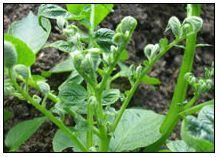
The UK-based Soil Association has sharply criticised the UKgovernment’s decision to consider reinstating aminopyralid, a pesticide whichit says has caused huge amounts of damage to fruit and vegetable crops, andwhich was withdrawn from the market last year.
The Soil Association’s director, Patrick Holden, has writtento Hilary Benn, Secretary of State for the Environment, Food and Rural Affairs(Defra), urging him to reject a recommendation from the Advisory Committee onPesticides (ACP) to reinstate the use of aminopyralid.
ACP’s recommendation came, according to the SoilAssociation, following 'stewardship' proposals from Dow Agrosciences, thepesticide’s manufacturer, aimed at making use of the product safer. However, itsays, the pesticide is still causing a wide range of crops to fail after itslast permitted use in early 2008.
“This pesticide has not been reformulated, nor made safer inany other way,” says Mr Holden. “There is no evidence to show that the‘stewardship’ proposals made by the company producing the pesticide, DowAgroSciences, will work. The proposals – which include only selling the productin large containers to make it ‘too expensive for casual use’ – provide noguarantee that further damage can be prevented. Indeed, Hilary Benn alreadyknows that this approach does not work. There were already guidelines in placeto prevent the use of manure from land treated with aminopyralid from beingused for vegetable growing, which did not stop serious contamination incidentsfrom occurring.”
According to the Soil Association, when its use was lastpermitted the pesticide caused the failure of a wide range of crops includingbeans, peas, potatoes and tomatoes, soft fruits and flowers.
The Association has revealed its concern that such cropfailures could discourage people in the UK from growing their own vegetables ingardens and allotments.






No comments yet